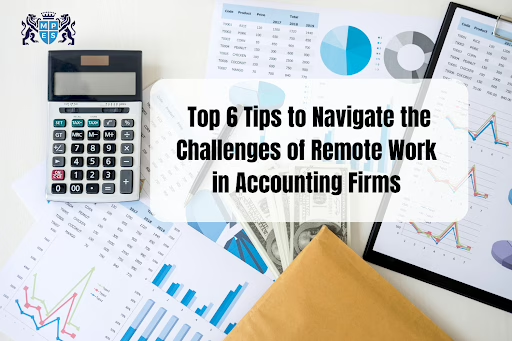Top 6 Tips to Navigate the Challenges of Remote Work in Accounting Firms

Remote work has transformed the accounting profession, offering flexibility but also introducing unique challenges. From managing sensitive financial data to maintaining clear communication with clients and teams, remote accountants must adapt to an evolving digital landscape.
Success in this environment requires more than just technical expertise; it demands the right tools, structured workflows, and a well-balanced approach to work and personal life. Building a strong foundation in financial principles, such as those covered in ACCA Foundations, can help accountants develop the essential skills needed to navigate these challenges with confidence.
Whether you’re a seasoned accountant or transitioning to remote work, these essential tips will help you stay productive, compliant, and stress-free. Let’s explore the key tips to mastering Financial Accounting in Remote Work.
Table of Contents
- Invest in Secure Cloud-Based Accounting Software
- Set Clear Communication Channels
- Improve Digital Collaboration with the Right Tools
- Keep Up with Compliance and Regulatory Changes
- Establish a Distraction-Free Home Office Setup
- Set Boundaries Between Work and Personal Life
- Conclusion
- Invest in Secure Cloud-Based Accounting Software
When handling sensitive financial data daily, remote accountants prioritise security first. Using cloud-based accounting software guarantees access to financial records from anywhere and maintains their protection. Encrypted storage, multi-user access, and automated backups provided by platforms including Xero, QuickBooks, and Sage help to stop data loss and illegal access.
READ ALSO: Is Deepseek R1 Worth the Hype?
Beyond security, financial accounting in a remote work environment can be streamlined with the correct tools. Seek solutions that produce real-time reports, automate reconciliations, and link with financial systems. These tools guarantee that financial data stays structured and accessible by increasing accuracy and lowering manual mistakes.
- Set Clear Communication Channels
One of the main issues that remote accountants deal with is miscommunication. Misunderstandings might result in missed deadlines or accounting problems if there are unclear guidelines. For collaboration to go smoothly, businesses must set up organised communication procedures.
Teams can maintain communication using Zoom, Microsoft Teams, and Slack. Establish standards for response times, planned meetings, and daily updates. To preserve clarity and prevent unnecessary follow-ups, encourage team members to record important conversations in shared workspaces. When working on intricate financial tasks, written records offer a trustworthy reference that clears any confusion.
- Improve Digital Collaboration with the Right Tools
In remote work, spreadsheets are no longer sufficient for managing financial accounting. Accountants require real-time communication tools to collaborate effectively on tax returns, payroll, and financial statements. Multiple users can simultaneously see, edit, and update records with cloud-based ERP systems, Google Sheets, and accounting dashboards.
Setting up dashboards for real-time account tracking ensures greater accuracy and transparency. Additionally, by doing away with the necessity of endless email chains,
these systems speed up approvals and lessen bottlenecks in financial procedures. In remote accounting teams, smooth collaboration increases overall productivity.
- Keep Up with Compliance and Regulatory Changes
Financial rules are always changing. Therefore, accountants must always be compliant. Remote employees must strongly monitor updates about tax laws, financial reporting guidelines, and auditing requirements to avoid expensive mistakes.
Accountants may acquire important regulatory information by reading finance industry newsletters, attending virtual conferences, and taking classes like ACCA Foundations. Professionals who keep learning ensure they stay on top of changes in their field and keep their financial practices accurate. Keeping an eye on compliance helps clients trust and believe in you.
- Establish a Distraction-Free Home Office Setup
A neatly managed home office considerably increases productivity. A specialised workplace that reduces distractions and allows for extended periods of in-depth financial research is necessary for remote accountants. Investing in comfortable furniture, fast internet, and headphones blocking noise makes a space good for working.
When accountants use two monitors, they can compare financial records, spreadsheets, and reports simultaneously, making their work more efficient. Mistakes are decreased, and workflow productivity is raised by keeping the workplace clear of clutter and upholding an orderly file system. A workplace environment free from distractions allows professionals to perform more quickly and accurately.
- Set Boundaries Between Work and Personal Life
Work-life balance is one issue that many remote employees face. Without defined boundaries, accountants can work past their regular hours, which could result in burnout and decreased output. Establishing consistent login and logout times keeps work from consuming personal time and aids in creating a regular schedule.
Promoting brief pauses throughout the day helps people concentrate better and avoid becoming tired. Reducing errors in financial computations and improving mental clarity can be achieved by taking a little break from displays. Long-term performance and job happiness are improved when work and personal life are balanced.
Conclusion
It takes the correct mindset and resources to adjust to financial accounting in a remote work environment. Accountants can successfully navigate obstacles by prioritising
security, teamwork, and organised processes. Digital accounting is the way of the future; embrace it with assurance and effectiveness.
For those who want to learn more, MPES Learning has courses equipped to meet the needs of accounting professionals.








